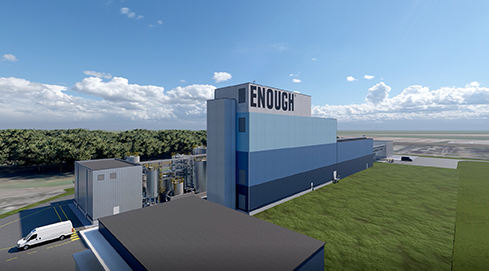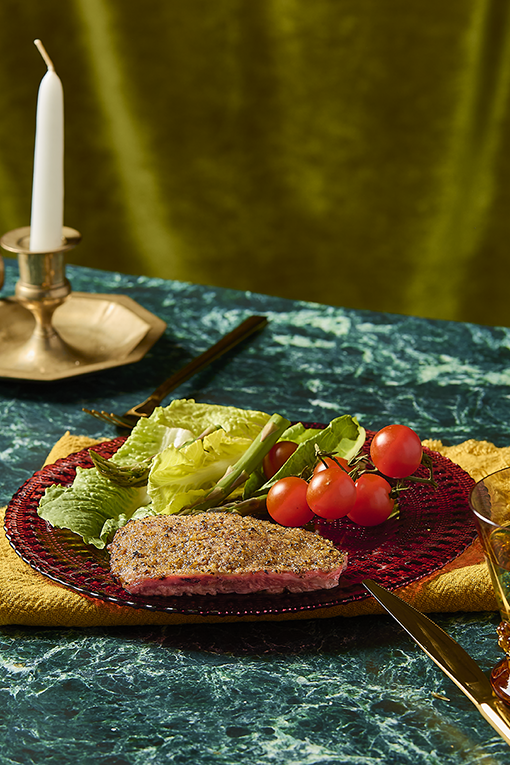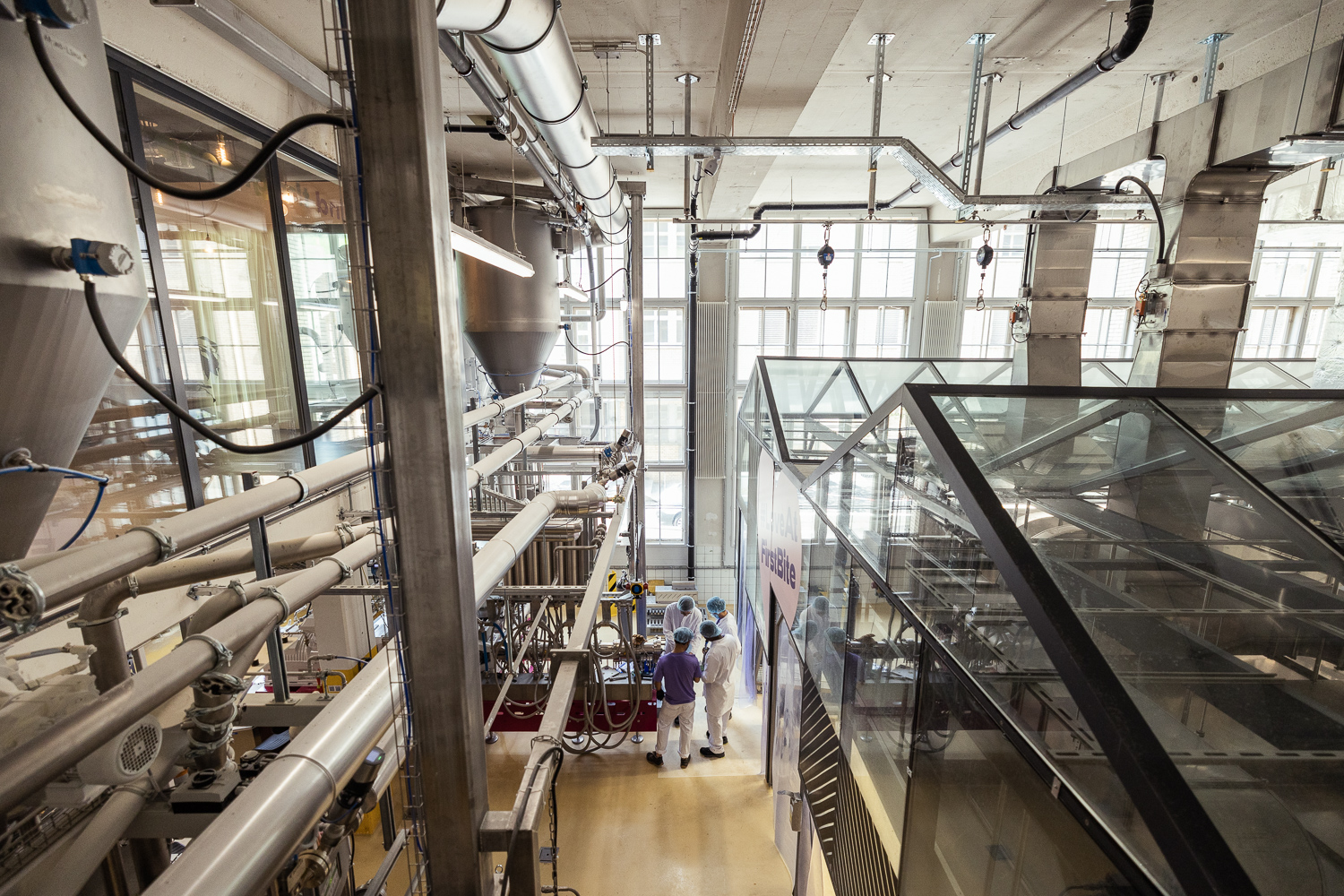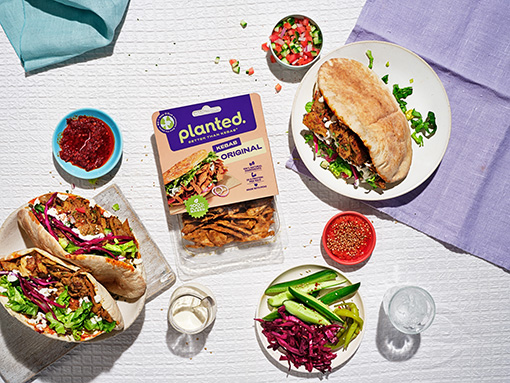

Meat market
Developers of chicken and pork substitutes are working hard to perfect healthier, tastier and more sustainable alternatives that measure up to their conventional counterparts. Louise Davis speaks to a select few trying to make the numbers work, too
Think of a chicken wearing a new coat. That’s the advice offered on the Enough website as a way of encouraging those curious about its products to embrace the concept of alternative meats. It’s an apt illustration of what players in the alternative chicken – and indeed pork, as we’ll discuss here – markets are trying to achieve. Meat… but not quite as we know it.

recently inaugurated what it states is
the world’s largest mycoprotein facility
Enough’s CEO, Jim Laird, reveals that it is sustainability that underpins most of his work. “At Enough, we see our purpose as helping to make the consumption of protein to be more sustainable, by growing food protein in a manner that is materially more environmentally efficient and also more cost-efficient than doing so using the animal,” he explains.
“The truly compelling reason that convinced me to commit to growing protein using fungi and fermentation is due to the efficiency in feed-stock conversion,” continues Laird. “In comparison with poultry, it uses about three times less inputs, and compared with beef this is 10 times more resource-efficient.”

Enough’s flagship product is the ‘Abunda’ mycoprotein, which is created using large-scale fermentation to grow the whole biomass of a fungi that Laird reveals “looks a little bit like chicken mince or bread dough when it’s produced – in that it is pale in color and has a meat-like consistency”.
Fermentation technology for alternative meats is becoming popular, but interestingly Laird points out that Enough’s approach differs from other offerings in the market due to its route to market more than its technology. “We are resolutely focused on a B2B model that creates infrastructure and scale rather than on creating a branded B2B model. The reason for this is because we believe that the constraint on the market is the absence of scale and that there is a vast need for healthy, sustainable protein.”
Laird’s frequent use of the word ‘sustainable’ is far from marketing-speak. On 16 September 2022, Enough completed the construction phase of a first-of its-kind factory co-located with a biorefinery. “We process sugars that are converted from wheat in the neighboring biorefinery and any of the sugars that are not fermented are passed back to the biorefinery to be upcycled into other products,” Laird details. “This creates a zero-waste process to grow protein.”
Enough’s current focus is on completing the first plant with 10,000 tons of capacity and, with that, the company “will account for about 4% of the global fermented protein market”, notes Laird, who further adds that plans are in place for a financing round in 2023 that will enable his firm to quadruple capacity at the same site. “Although building factories is great fun, we are even more excited by the quality of delicious food that we can make, ranging from raw cook burgers to whole-muscle vegan chicken.”
.jpg)
Wurst case scenario
Also aiming to produce delicious food is the Netherlands-based cultivated meat start-up, Meatable, which revealed its pork sausage in July 2022 – not bad for a firm founded in 2018. But Daan Luining, Co-founder & CTO, has been involved in the evolution of cultivated meat since its very earliest stages. He worked on the first lab-grown hamburger to be cooked and eaten during a news conference back in 2013. Focusing on optimizing the cell growth and density of the meat patty using micro carriers, Luining says that, “Meatable stands out from other cultivated meat companies with a big differentiator: some other companies use cell tissues from animals in the form of fetal bovine serum (FBS) – which is harvested from cattle fetuses. As Meatable is committed to the production of cultivated meat without harm to animals, we have developed a production process that doesn’t require FBS. We use Mark Kotter’s ‘opti-ox’ technology based on a single cell taken from an unharmed animal immediately after it is born. Removing animal harm from the meat industry is now absolutely within reach, as we’ve seen with the unveiling of our pork sausage.”
Contemplating his achievements so far, Luining says, “What we’ve learned from this development experience is that the Holy Grail in the cultivated meat industry lies in the capability to deliver, at scale, cultivated meat that looks like, tastes like and has the nutritional profile of traditional meat.”
Looks and nutrition aside, the issue of taste is paramount for any products entering this market. But how can you develop a product that tastes ‘right’ when you are not legally allowed to conduct taste-testing in your home country? “As our sausages are our proprietary product, tasting is allowed under strict conditions for the two founders and owners of Meatable at this time,” Luining reveals. “In March 2022, the Dutch House of Representatives adopted a resolution to enable tastings of cultured meat under controlled conditions within the Netherlands. The motion is aimed to allow tastings for a wider audience. We are now working with regulators to get this motion into effect. It is focused primarily on making cultivated meat available on a wider scale and we are in full support of this ruling going into effect as soon as possible.
“The vote in favor of this legislation means we can start wider tastings soon, and in the meantime, we are educating a sensory panel to be fully prepared for when the new regulation comes in,” Luining explains. “We’re going to continue to refine and develop the product with the support of our sensory panel, who have been trained on their sensory skills to ensure we’re creating the right texture, looks and smell, as well as taste for the overall eating experience.”
Removing animal harm from the meat industry is now absolutely within reach
Even if Luining and his team achieve those goals – and they’re currently on target to have pork products on sale by 2025 at the very latest – they’ll come up against a legislative headache trying to sell their products in the Netherlands. Naturally, the Dutch entrepreneur has given this careful thought. “We’re launching in Singapore first – given the very favorable regulatory environment there and the country’s ambition to be a hub for the sector. That being said, the UK and the USA are important global markets for us and for the industry – meat consumption in these countries is high, and there is a large groundswell of potential customers, a high GDP per capita which encourages meat consumption, and also a high cultural demand for products such as ours.”
Luining is, however, prepared to play the long game. “Our mission is not to be the first to present our meat to the world but to build a sustainable business that’s able to put a dent in both animal husbandry and climate change.”

Loin of duty
Sharing similar desires but on the other side of the pond is Nieves Martinez Marshall, the Co-founder & CEO of Novel Farms. Reflecting on the huge response to her firm’s recent introduction of the first-ever marbled cultivated pork loin – and looking ahead to a busy few years – she proudly says, “We have developed a cultivated meat product that resembles a pork loin cut at lab scale. Our next goal is to build a production plant for the commercialization of our products at large scale. We plan to build a pilot plant in 2024, launch in selected high-end restaurants and fine dining venues in 2025 and launch in food-service in 2026.”
Ambitious aims, but, as Martinez Marshall tells Protein Production Technology International, the company’s approach of producing whole cuts of cultivated pork using muscle and fat cells (around 65% cell mass, she confirms) and a scaffold that consists of microorganisms commonly used in food as sole ingredients, is extremely scalable. “Our unique scaffolding platform is 93% less costly than comparable structuring technologies (i.e. alginate scaffolds functionalized/coated with collagen fragments) and it is also highly functional, which means we can incorporate additional properties to it at no extra cost. By tuning the scaffold properties, we can not only provide structure to our cultivated meat products but also enhance muscle fiber formation and reduce the cost of culturing media, allowing us to delineate a clear path for the commercialization of their products at price parity.”
As a result of those advantages, Martinez Marshall believes that, “Scaling, for us, will be more straightforward in regards to cost-effectiveness, meaning that our technology readily allows us to have a roadmap to reaching price parity”. She adds, “We have conducted a techno-economic analysis that estimates we could reach US$8/kg via the use of our scaffolding platform. This will allow us to focus on other challenging areas such as bioreactor design.”
Similar to the founders of Meatable, Martinez Marshall and Michelle Lu, Co-founder, have also given much consideration regarding how best to launch their products in a challenging legislative environment. In Novel Farms’ home region, the cultivated meat industry will be overseen by the Food and Drug Administration (FDA) and the Department of Agriculture (USDA) – and each company is required to obtain approval for its products on a case-by-case basis. Martinez Marshall hopes that by the time her products are ready for market, legislation will have caught up with technology. “We plan on launching in the USA first. If the regulatory approvals in the USA have not progressed by 2025, we will consider launching in other countries where cultivated meat is already approved.”

Growth strategy
Of course, one way to get into the alternative chicken and pork products market without encountering legislative hurdles is to sell products that are solely plant-based. Swiss firm Planted sells both chicken and pork products (along with kebab and schnitzel products) that are based on different protein sources (peas, oat, sunflowers) and that aim to deliver the perfect bite. “Inspired by nature, we are pioneering a novel biostructuring approach that combines protein structuring and biotechnology,” says Judith Wemmer, Member of the Executive Board & Head of Product Development. “Using various proprietary technologies, we design and structure alternative proteins in any size, shape and fibrous texture. We are convinced that biostructured proteins will outperform animal meat in the future in terms of taste, sustainability, health, efficiency and price. At Planted, we’re committed to using only clean and natural ingredients and no additives – making it a healthy and sustainable option for all. Truly better than animal meat.”
To do all of the above, Planted uses a combination of fermentation and protein structuring. The firm operates its own production plant that allows it to have full control over science, product development and sale to consumer. “Hence, we can rapidly deploy innovations from lab scale to large-scale production. This allows us to only use natural ingredients and no additives,” confirms Wemmer.
We are convinced that biostructured proteins will outperform animal meat in the future in terms of taste, sustainability, health, efficiency and price
Planted recently launched its first product within a new whole-cut range: a chicken breast. “We believe this is a category-defining new product that shows the depth and versatility of our amazing team – and expresses our mission to create products that are simply better than meat from animals in all dimensions,” says a delighted Wemmer.

She is also excited about what’s still to come from Planted. “We will launch whole cuts over the next two years that will change how alternative proteins will be perceived, both in structure and taste. Our tech stack allows us to structure the molecular core components of meat from micro- to macro-scale. With this versatile, bottom-up approach we can design and structure meat in any size, shape and texture.”
If you have any questions or would like to get in touch with us, please email info@futureofproteinproduction.com
More Features

Feeding change

Protein Pioneer: Kesha Stickland









